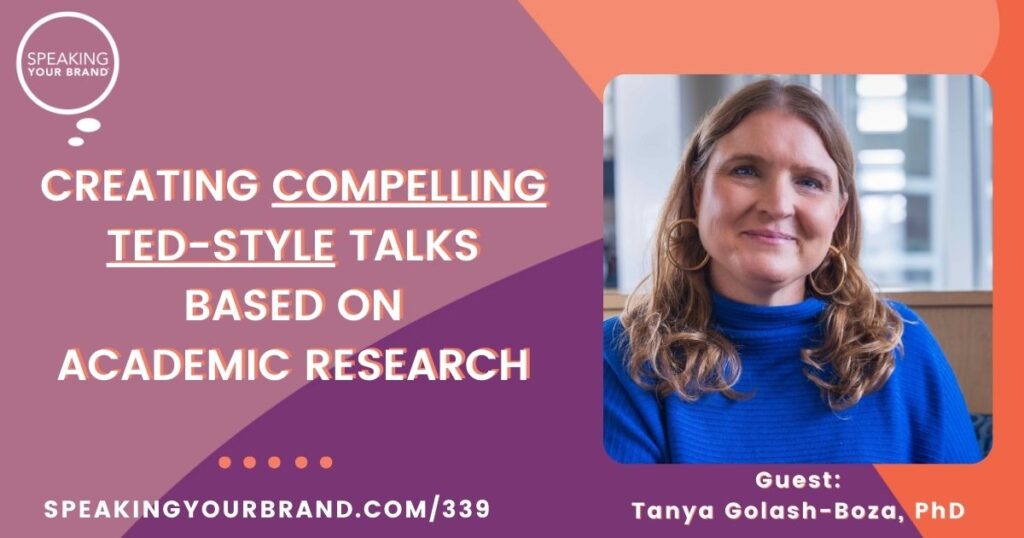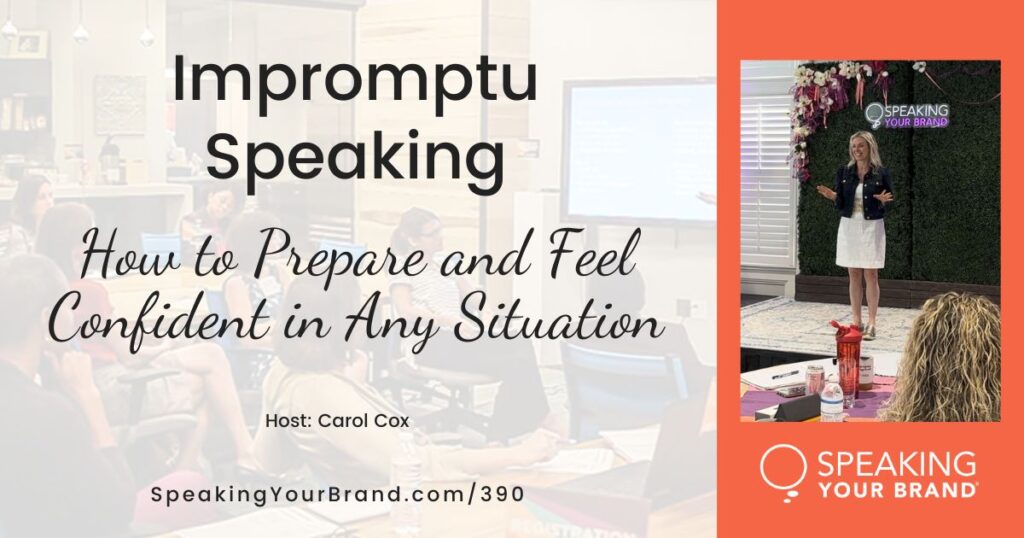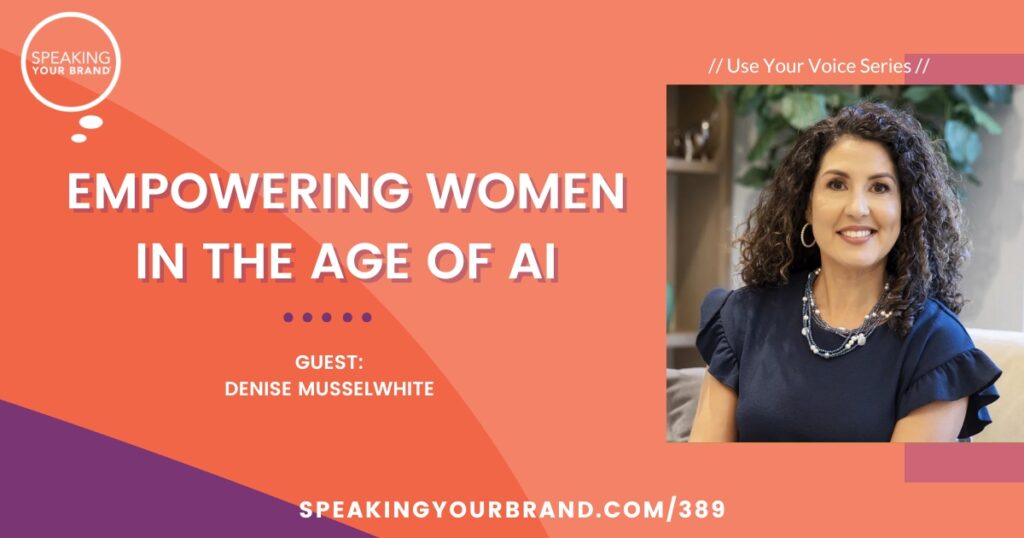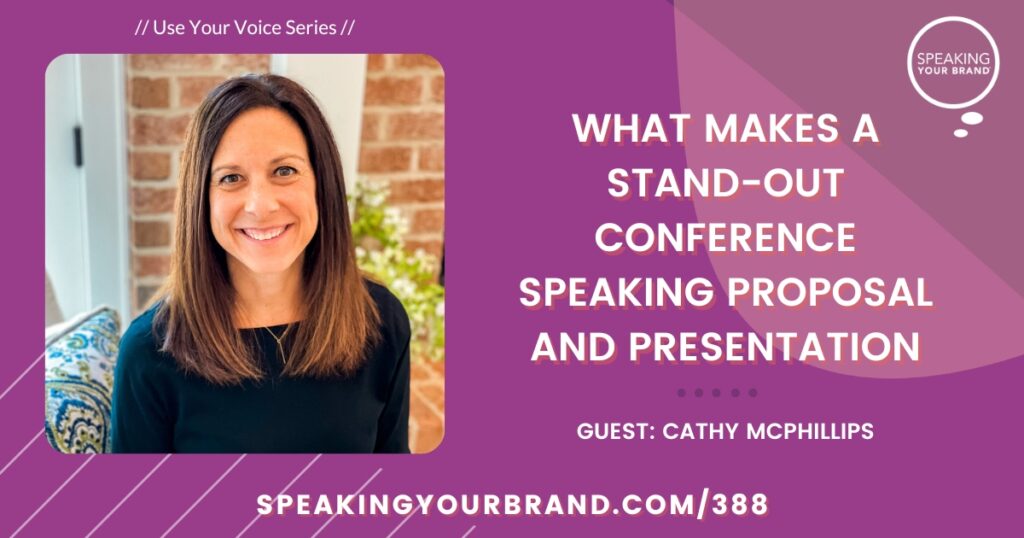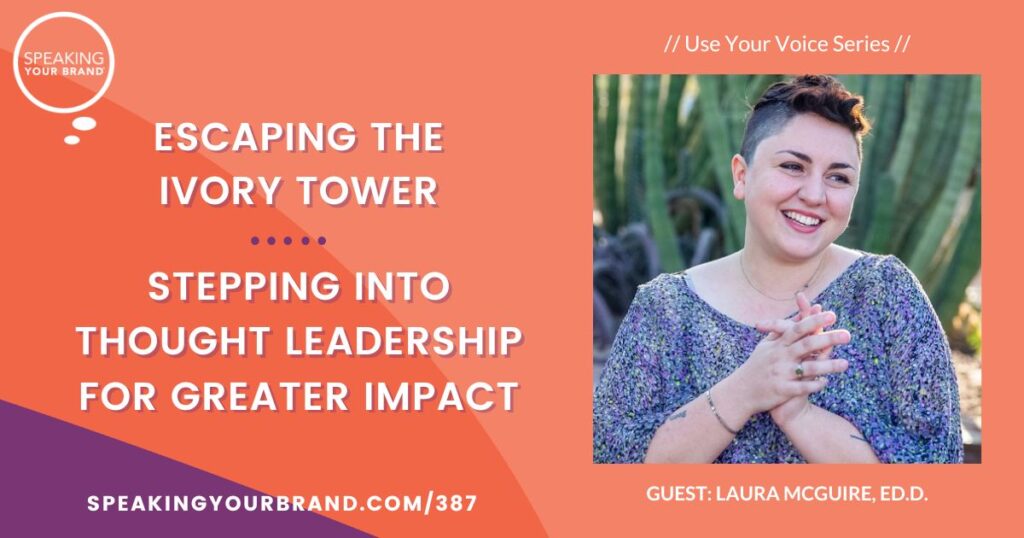339-SYB-Dr-Tanya_Golash-Boza.mp3: this mp3 audio file was automatically transcribed by Sonix with the best speech-to-text algorithms. This transcript may contain errors.
Carol Cox:
You’ll be inspired by my conversation with Dr. Tanya Gulak Bozah and how you can use public speaking to influence social change. On this episode of the Speaking Your Brand podcast. More and more women are making an impact by starting businesses, running for office and speaking up for what matters. With my background as a political analyst, entrepreneur and speaker, I interview and coach purpose driven women to shape their brands, grow their companies and become recognized as influencers in their field. This is speaking your brand, your place to learn how to persuasively communicate your message to your audience. Hi there. Welcome to the Speaking Your Brand podcast. I’m your host, Carol Cox. Today we are diving in to how public speaking can be used to influence social change. So I know that many of you listening, you’re entrepreneurs, so you use public speaking to grow your business and your brand. And for lead generation, which is of course what we do here at speaking your brand as well, but also very near and dear to our heart is ways to use public speaking to change the world. I know it sounds like a really big ask, but indeed, public speaking, does that think of all the amazing people who have come throughout history in so many of them made their mark through public speaking, whether it was on traditional campaigns, tree stumps or on bigger stages? That’s why I’m so excited to bring to you today Dr. Tanya Goulash Bosa, who is the executive director of the University of California’s Washington Center. She’s also a professor of sociology at the University of California at Merced. Tanya was on this podcast way back in February of 2021 after she delivered her Ted Talk the prior month. She had gone through our Thought Leader Academy and worked with us during that time to create her Ted Talk, which she delivered. I’ll make sure to include a link to that in the show notes. And so when Tanya reached out to me to collaborate with her and her speakers, I was so excited. And we’re going to talk today about that collaboration and what came out of it. Tanya, welcome back to the podcast.
Tanya Golash-Boza:
Oh, it’s so great to be back. Thank you, Carol.
Carol Cox:
First, tell us a little bit about the University of California’s Washington Center. So you moved all the way from California to Washington, DC, which I know is your hometown, to be the executive director there. Tell us about what the Washington Center does.
Tanya Golash-Boza:
Yeah, the Washington Center, what we are is we bring students from the University of California to Washington, DC. They take classes here taught by University of California faculty and also taught by local professionals. And the students take classes related to government, anything related to Washington, DC, and then they engage in internships. So they come here. It’s almost like a domestic study abroad. So students come to DC because they want to know more about how decisions are made in the nation’s capital and we facilitate that experience.
Carol Cox:
Oh, that is so fun. And again, I know that you grew up in Washington DC, so has it been nice to be back?
Tanya Golash-Boza:
Oh, it has been beautiful to be home. Yeah. This morning I went on a walk with two of my high school friends.
Carol Cox:
Oh, that is so great. And well, in your Ted Talk and the research that you’ve been doing is around gentrification in Washington, DC, Can you give us a quick overview of that, of your research and your Ted Talk?
Tanya Golash-Boza:
So my book is about how Washington DC is a city that became gentrifiable, right? Because gentrification doesn’t happen in wealthy neighborhoods. Gentrification only happens in neighborhoods that have been subjected to disinvestment, which basically means that the city stopped investing in public schools and public services, particularly in black communities. So my book looks at how and why that happens and how the city became a city that is gentrifiable. And that book is coming out in September.
Carol Cox:
Oh, congratulations. Thank you. That’s great. And so, Tanya, let’s go into now the event that just happened about a month ago as of the time that this episode will be released. So the event you called a change the world through research, which of course, again, is something that I’d love to hear as someone who would, you know, had a brief stint in academia as a PhD student. You know, I, I love research, I love ideas. And I love the faculty members that you brought to us so that we could learn more about their research and help them change the world through it. Why did you decide to put this event on and what was the goal of it, and how did you decide what the what the elements would be?
Tanya Golash-Boza:
So when I think about the Washington Center right, we bring students to D.C. to engage in internships, and we do that so that students can get a better idea of how decisions are made. And the goal there is that the students feel empowered to become decision makers themselves in the future. But the University of California also has a stellar, stellar faculty. We have thousands upon thousands of amazing researchers who also I would like to see more heard in Washington, D.C. So I’m just a big fan of policy based or evidence based policy. So I want more more of the policies that we pass to actually be grounded in research. So one of my goals for this center is that we become the place where University of California faculty. Come to present their ideas to legislators, policy makers, thought leaders in DC. So that’s the overarching goal. When thought about how to do that, I thought about an event, a speaking event that where we could bring people in and have these dialogues and have these conversations. But I also know that although faculty have fantastic ideas and often have extremely relevant ideas for policy, they’re not always capable of delivering those ideas in a way that’s compelling. And actually, let me just backtrack a little bit to talk about how I found you and your work in the first place.
Tanya Golash-Boza:
So maybe four years ago, I wanted to become a better public speaker. And there’s lots of people out there that do public speaking trainings, but a lot of them were geared more towards small business people or kind of this had a little more superficial like about how you talk or don’t say, um, or those kinds of things. And I was looking for someone who could really dig down into storytelling techniques, into narrative, into sort of making a story, making an argument that’s compelling. So when I started, when I found that’s how I was looking on podcasts, literally just searching, speaking. And I came across your work and I was like, Oh, wow, you know, Carol is a feminist. She’s very smart. And I think I even caught that. You spent some time in academia, and I was like, Oh, I should try working with her. And I honestly had a lot of trouble finding someone to work with who understood academia, because I do think academics bring a lot of value to the table, but we also need a lot of help getting our ideas out there. Okay, so I had that experience myself of working with you and figuring out a way to share my policy ideas, share my research in a compelling way.
Tanya Golash-Boza:
And and I know this is not common at all, like very few faculty that I know and I know a lot of faculty, very few have done any sort of speaking training, which is remarkable because we give lectures, you know, every day we go to conferences 2 or 3 times a year. Despite doing that, we don’t put a lot of thought into how to do it better. And I and I just think it’s just I mean, public speaking is a skill and it’s a skill that can be taught. It’s a skill that can be learned. So the one side of it is I want people to come here and present their research, the other side of it, as I want them to do it in a way that’s compelling and enjoyable so that people really take in the message. So that’s how I came up with this idea of bringing a few faculty to D.C. to share their research and then to have you train them, you and your team of coaches train them so that they would be compelling and just say it worked because people were emailing me afterwards. How did you find such amazing speakers?
Carol Cox:
Well, okay. They had amazing research and amazing ideas and amazing stories, and I really see our role as giving them the framework and the coaching to put it together in ten minutes. So I want to talk about that, Tonya, because as you mentioned, most faculty members, they’re used to lecturing in front of classrooms. They go to academic conferences, and there’s a certain style and expectation there. It’s a you know, it’s a lecture or a reading of a paper or maybe there’s some discussion of it. So very different than the style and the format that you wanted to do because you decided to do ten minute Ted style talks. So those of you listening, I’m sure you’ve seen Ted talks. Ted talks online. Most of them are about ten minutes max, 18 minutes long. So very short, very concise. And you have to be able to share your message in a way that really lands with the audience. And you a lot of times people feel like, well, ten minutes isn’t enough time. But if you if you listen to someone for ten minutes, you realize it actually feels longer than you realize. I’m telling you. Why did you decide that you wanted to do the ten minute Ted style talks?
Tanya Golash-Boza:
I mean, first of all, I found that I find the ten minute Ted style talk just to be a compelling way to get across one clear message. So if we want we weren’t thinking like, Oh, this person is going to present their research on how to recycle carbon in concrete. And then the, you know, the legislator is going to go back the next day and implement the policy. No, it’s more about getting people inspired, getting people thinking about these ideas. So we wanted to do we wanted people to do research that’s related to policy, but we also wanted what public speaking really is, which is the beginning of a conversation like sparking a dialogue. So the idea was not for someone to come in and present, you know, a ten point policy proposal, which is only going to be interesting to the people that are going to go back the next day and actually implement that policy. But instead we wanted to introduce a wider range of speakers and really draw on the storytelling so that it’s engaging, so that it’s interesting. My nightmare as an event organizer is that everyone’s falling asleep, right? Like where everyone starts talking in the back because it’s boring, right? I wanted to create an engaging event. So I think the Ted style is one way to create a really engaging event.
Carol Cox:
Yes. Because it keeps the agenda moving along, too. And also, as the audience, you know, this person’s only going to be up there for max ten minutes so I can sit through that. All right. And I know they did an incredible job, from what I heard from you and from the speakers. Themselves. So and I and I know that from working with them. So we did some individual one on one coaching with each of them, as well as some group Zoom workshops to help them prepare for their talks. And I know that from the ones that I coached one on one, what they would say to me is, Well, I have so much that I want to share and I really want to make sure that they understand, you know, because X, Y, and Z, because as the academic, as a researcher, they know so much and they have so much passion for their research area and for the change that they do want to say. And so my advice to them was, like you just said, is that there’s no way you can share your 15, 20 years of expertise with someone in ten minutes, much less 30 minutes. But what you can do is perhaps get them to think differently or to change a mental model or to see that there perhaps is a solution that they haven’t encountered before. Regarding your topic area.
Tanya Golash-Boza:
Exactly. Yes, 100% agree.
Carol Cox:
So, Tanya, let me ask you, how did you go about selecting the speakers who ended up on your stage?
Tanya Golash-Boza:
So this program was funded by the University of California Office of the President. And the funding guidelines were along the lines of we need to do something that promotes the mission of the University of California. So I wanted it to be connected to what we do at the UC in order to secure the funding, but also in order to deliver on our funding objectives. But but but those objectives also align with what I think is important, which is I wanted the research. So the call for proposals was that the research had to be related to policy. So there needed to be some concrete suggestion. And but the research also should be aligned with some element of social justice because that’s one of the fundamental values of the University of California. And then we gave priority to speakers who were a little earlier in their career in order to develop them as as faculty members. Well, that’s really nice.
Carol Cox:
I have a list here of some of the topics that they shared. So just to give everyone here an idea, so we have everything from one that was called Open our Borders. America’s New Conversation about immigration. We had one about African kingdoms as resourceful corporations. The story of South Africa’s Bafokeng we had one that was about the healing power of community. My unexpected journey as Army. So is the Korean pop group sensation. We had another one on 40 New York City. I mean, just like you said, a wide ranging group of topics, but related to, like you said, policy ideas, but also social justice.
Tanya Golash-Boza:
Exactly. And I think it was great to have them all together because my research is more in the area of the prison abolition or the immigration. So those are the talks that I would have gravitated to if there were like breakout sessions. But I learned so much from the talk about the Bafokeng kingdom, which was just about how there’s this kingdom in South Africa that has a lot of diamonds and that has and how they share all the resources with the community instead of just hoarding them. And the talk about concrete, which is not the one I would have wouldn’t have been top of my list. I was like, that was so powerful. Just thinking about how we can replicate the carbon cycle by putting carbon into concrete. And I was like, This is such a good idea.
Carol Cox:
Yes, right. And that is really that is the power of the ten minutes of a Ted style talk, because you can take something like that and just give someone like you almost like you have to do a deep dive in the sense of like that South African kingdom. Who is sharing the resources or about the concrete and like relating it to what nature does naturally. Right. And how we can replicate that in our human made systems. Okay. So Tanya, so you selected the faculty members who were going to participate and you reached out to me to to have us work with them to develop their talks. Why did you decide to have someone help them with their with their talk? I mean, we talked about this a bit earlier because you wanted to make sure that they were compelling to the audience. And then what were you hoping that we would help them to do?
Tanya Golash-Boza:
Well, I was sure that what you would help them with is first get a clear idea of what their message is, connect that message to something about them. Like why are you the person to giving to give this message? Because then it kind of personalizes it. And then also to use rhetorical devices, speaking techniques that make it compelling to help them with their presence on stage, with the with their performance, and also to give them the confidence that they can do it. And you all did a fantastic job. I mean, the speakers were to a person amazing. And by the time this this episode airs I’ll have a link ready for you to share so everyone can also see just how great the speakers were.
Carol Cox:
Oh, that’s exciting. And so we had myself, of course, one of the coaches as well as Diane Diaz, our lead speaking coach, and Joyce Spencer, who works with our clients on storytelling and speaking, and Joy lives in the Washington, DC area. So she was able to to be there at the event in person, which was so jealous of when she sent me pictures. But I was so glad that she was able to see them in action.
Tanya Golash-Boza:
Yeah, it was amazing to meet. Joy also worked with Joy when I participated in the Thought Leader Academy, so it was so great to meet her in person. I know. These. It’s been great to have this opportunity to connect online, but the in-person connection is so meaningful.
Carol Cox:
It is. And yeah, I’m excited to to be doing more in-person events myself. So. You mentioned about making sure that they brought in a personal story or a personal aspect of why the research was important to them. And I know that we stressed that a lot to them in the very beginning of the first workshop that we did for them about making sure that they let the audience know why this mattered to them in the first place, because then by extension, then the audience will understand why they could potentially care about it. And you mentioned one about concrete, and I worked with her doctor, SAB Miller, which she is fantastic. She is so brilliant as an engineer. And what she does and the way that she ended up starting off her talk was sharing a story about growing up on a farm and realizing at some point at a young age, you know, eight, ten years old, that if the farm was getting sprayed with pesticides all the time, as much most farms were, especially back then, and realizing that the horses that were on her property were being exposed to all their pesticides while her mother shooed her and her siblings inside the house when the pesticides were being sprayed by the low flying airplane. So she ended up convincing her mom to turn the farm organic instead so they didn’t have to use those chemicals. And then she related to that. You know, if nature has already figured these things out, nature has figured out how to balance the ecosystem to make it healthy. How else can we use that in our environment, like with concrete so that we’re using nature instead of working against it? Yeah.
Tanya Golash-Boza:
When I think back on the talks, the easiest thing to remember is the personal story, because that’s what we connect to, right? And that’s where the emotion lies and our memories are associated with emotion. So I remember first, Oh, the poor little horses. And then I remember the carbon cycle, right? So it’s kind of it all connects back through. Like it’s so interesting to think about story and then how the brain works, how we experience things and what we remember. And then and that helps us think more about how public speaking can work.
Carol Cox:
Yeah, exactly. And when I think about the other faculty member that I coached one on one, which is Grace Delgado, and she talked about the border, the US-Mexico border, and how obviously it’s been, you know, both open and closed throughout, you know, the past couple hundred years. And she taught, you know, of course, she’s a historian, so she’s very much into the in the history. But then she shared a very personal anecdote about how her mother and her mother’s siblings had crossed the border, you know, way back, I think it was in the 1940s and their experience growing up. And then an uncle who was very much on the other side of how they thought about immigration and again is I remember those personal stories and it helps me to remember her overall point of the talk. And without those personal stories, probably most of them would have ended up as a blur. Exactly.
Tanya Golash-Boza:
I know it’s hard. It’s hard for I think it’s hard for anyone. It’s particularly hard for academics to share those personal stories because they’re seen as not serious. But it’s so clear that they help make the point. The other thing about sharing personal stories is it makes you vulnerable. Right now, people know that Savi cares a lot about horses, and now people know that Grace’s uncle is anti-immigrant. So people know these things about you. And it’s it’s uncomfortable because now maybe someone would just come up to her and say, oh, you’re such a horse lover. I don’t know.
Carol Cox:
I don’t know. But then you have people are like, wow, you love horses. So do I. Let’s go have some coffee and get to know each other.
Tanya Golash-Boza:
Exactly. It creates connection. I think we’re scared of it, but it’s kind of ridiculous because it creates it definitely creates connection when people know a little bit more about you than they’re like, they can connect. I know, like you and Cara were about the same age. We grew up during the same time period. So then I know we connect on those things because it makes me feel connected to you knowing that we grew up both in urban areas during the same time period and in the United States. A very particular experience.
Carol Cox:
Yes, for sure. Tanya So thinking about as the event organizer leading up to the event and then the the day of the event, what are some things that you did to help you as the organizer? For anyone listening who is organizing events and then any lessons that you took away from it that you would do differently or change up for the next time you do an event?
Tanya Golash-Boza:
The first thing I’ll say is event organizing is so much work. So the first thing you need is help. Like don’t try and put on an event by yourself. Like it would be impractical for one person to do this themselves. So it’s really important to rely on people, on other people have people around you that can support, had a ton of support from multiple staff, like leading up to the event, getting, you know, getting everyone’s travel together, getting everyone’s lodging, just getting the room, the it, all those things. I think one of the things that I that I thought of towards the end that I’m really glad I did is we did a full run through the day of and I know that sounds like a lot, but people were happy that we did it and we identified some glitches. It was good for us, like for our team in terms of the IT and the recording and the Internet, you know, just getting everything set, sort of deciding what we’re going to put on the Zoom screen versus what we’re going to have in the room. And then it was great for the speakers because they were able we did it at 11 a.m. and then the event was late. Do that afternoon at 530. So they then were able to identify any glitches in their talk, anything that they wanted to do a little bit differently. So I think the rehearsal was super important. We also had a reception at the beginning and a reception at the end. We didn’t do Q&A, which I know Ted, sources don’t don’t typically do Q&A, but instead what we did is we we kind of set up times where people could engage directly with the speakers. And I think that also worked well.
Carol Cox:
I agree a full dress rehearsal is so helpful. I know, Ted, events that I’ve been involved in in the past, they have definitely done obviously we’ve done just informal rehearsals leading up to the event. But I know that either the day before the event or the morning of the event, they will do pretty much a full run through of of each speaker’s talk. Yeah, Yeah. So for those of you listening who are participating in an event as a speaker, whether it’s a TEDx event or even just a regular conference event, if there’s any way that of course, if they offer any type of runthroughs either, you know, especially if it’s virtual tech, if they do like, you know, tech runthroughs or if it’s in person, any type of runthroughs definitely participate in those as much as you can. And if they’re not offering them, see if you can if you can suggest it, and they’d be willing to do that. Now, if you’re going to a conference where they have multi-track breakout sessions, like I’m going I’m speaking at a marketing conference at the end of July, they’re not going to have a full run through for every breakout session. Speaker So not those types of speaking engagement, but when you’re doing something like Batana described, you definitely want to do a full run through of that. All right, Tanya, as we think about what is next, you know, using public speaking to influence social change, I know that you’ve encouraged these faculty members to apply for Ted chapters, TEDx events that they can deliver their talk to, which is great, so that they get an even wider audience than they had at your event. What’s next for you and for the Washington Center?
Tanya Golash-Boza:
Good question. First of all, we are down a little bit staff, so no more events until I hire an event planner. So look out for that advertisement soon because we’ve done two events I took over in January 1st. So I did two events already, which is pretty fast. Um, and they were very successful. The first one was a conference on abolition. We brought people from around the world to talk about different ways of conceptualizing abolition, abolition of schools, abolition of prisons, abolition of borders, and it was a really great space. And then we did this Change the World through research conference mean symposium, really. So I think what’s next for us is really strategizing about the best ways to engage our constituencies and sort of and thinking about just a reasonable rhythm for the center. But I love thinking about public speaking. I love public speaking. So I’m excited to think about creative ways to bring academics together and doing stuff that’s outside the norm. Academic conferences have their place, but I think there’s so much room to think outside the box for academics, and I’m excited to be in a role where I really have the latitude to think creatively about how to bring people together.
Carol Cox:
I am so glad that you’re doing that, Tanya, and I know everyone who’s sitting in the audience is at those academic conferences are grateful for you for bringing about these changes. Tanya, thank you so much for the incredible work that you do. Thank you for supporting speaking your brand and thank you for coming back on the podcast.
Tanya Golash-Boza:
Thank you, Carol. It’s been a great journey getting to know you and the team over the past few years and wish you all the best.
Carol Cox:
Thank you. And for those of you listening, if you enjoyed this episode, please be sure to share it with a friend or a colleague, including professors and academics and researchers that you know, so that you can inspire them to use public speaking for social change. Until next time, thanks for listening.
Sonix has many features that you’d love including automatic transcription software, secure transcription and file storage, powerful integrations and APIs, upload many different filetypes, and easily transcribe your Zoom meetings. Try Sonix for free today.

